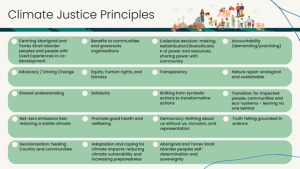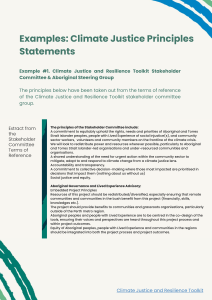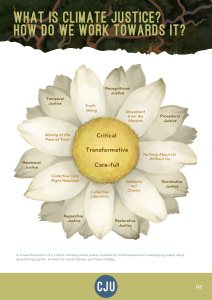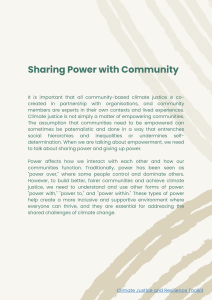1. Workshop planning
To develop climate justice principles, undertake the following activity with CSO teams:
- Ensure that you have provided your team with sufficient information about climate justice and CSOs for them to read before attending the workshop (see resources below).
- Prepare workshop materials, including presentation, paper or whiteboard, markers, or online equivalent.
2. Workshop delivery
- Provide a short introduction to climate justice and explain why you and your organisation are on the journey to integrate climate justice into your work and practices.
- Share the provided image (Image 1), discuss which principles are missing and add them to the image/list.
- Divide your team into groups and allocate some of the principles from the image below to each group, as well as the ones that were identified by the team. Ask each group to discuss their allocated principles and how they understand them.
- After some initial discussion about the principles, provide the groups with the following reflective questions to help guide a deeper conversation.
3. Reflective questions
- How does our organisation currently integrate these principles?
- How could we do this better?
- What structures are needed to enable perspectives from community, including Aboriginal and Torres Strait Islander peoples and peoples with Lived Experiences of discrimination and marginalisation? How could such structures not only enable being part of co-design and decision-making in a non-tokenistic and non-symbolic way but rather allow for Aboriginal and Torres Strait Islander leadership as well as Lived Experience leadership?
- How can our organisation reduce oppressive structures we reproduce (sometimes unintentionally), such as colonial, patriarchal, sexist, and ableist structures and assumptions within our programs, practices and management style?
- How can our organisation integrate intersectionality into our principles?
- What is the community asking for, and how can our organisation share or give up power, decision-making and resources to make space for strengths, skills and knowledges of the communities we work with and for?
- How can we work with community and Aboriginal and Torres Strait Islander peoples to become more trustworthy and accountable to the communities we serve?
- How can we ensure that what we are doing is not merely a symbolic action but also a transformative action?
The principles below are based on the Terms of Reference of the Climate Justice and Resilience Toolkit project groups, principles from the Climate Justice Union and the principles from the Fair, fast and Inclusive Climate Change Action – Blueprint Framework.
(Image 1)
- Debrief: Encourage your groups to present their discussions to the rest of the team.
- Discussion: Which of those principles should be adopted? Explain why, and list them by priority. Those will be your draft principles.
- Agreement: Write the draft principles along with an explanation of what each of them means and why it is important on a whiteboard and wordsmith together until you have a consensus.
- Endorsement: Seek commitment from the group that these are the principles that will form the basis of your organisation’s climate justice journey.
- Action planning: Define more precisely how each of the listed principles can be integrated into the organisation’s culture, practice, processes, and programs. Assign clear actions and responsibilities to specific teams, departments and people to ensure accountability and follow-through. Without assigning responsibility, actions are less likely to be implemented effectively.
After you have finished the workshop, copy the endorsed principles and agreed action items into an official document and communicate them to the broader organisation. Those principles can also be included in training and staff onboarding sessions. They can form the basis for internal policy-making, reviewing processes, programs and structures, and driving engagement in climate justice action within the sector.
4. Pre-readings and resources
